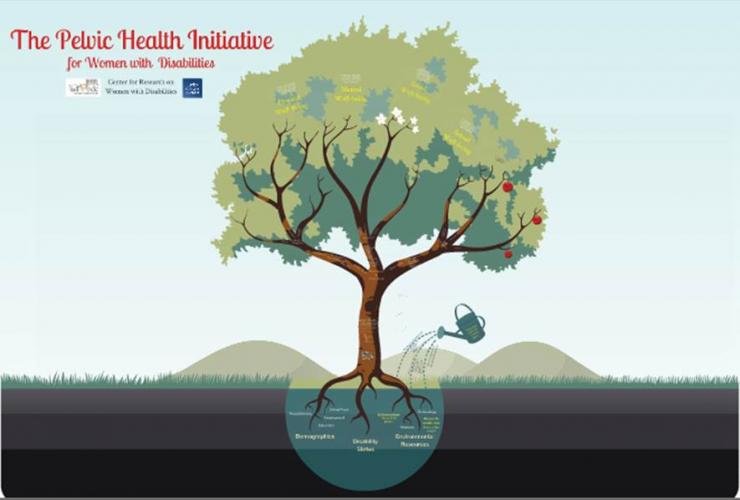
The "Tree" diagram on the right represents our model of pelvic health, from the context within which we live to the ultimate outcome we all seek – physical, mental, social and sexual well-being.
We have prepared a Prezi (a cloud-based presentation software and storytelling tool for presenting ideas on a virtual canvas) that uses graphics to connect our ideas.
View the Prezi presentation. A written description of the content is available below.
[Trunk of the tree]
Pelvic Health is the best possible functioning and management of the bladder, bowel, and reproductive organs. It is not merely the absence of disease or weakness in these organs. Pelvic health plays an important role in complete physical, mental, social, and sexual well-being.
It concerns the organs of pelvic floor: bladder, bowel, and organs of reproduction, including the ovaries, uterus, cervix, vagina, and external genitalia (skin).
Context
[Roots of the tree]
Health starts from the context within which we live.
- Demographics (race/ethnicity, education, employment, urban/rural)
- Disability Status
- Environmental Resources (information, finances, access to health care, and technology)
Information and Access to Health Care are focuses of this project.
Behaviors
[Watering can]
"Only feed what you want to grow."
[Water] Health promoting behaviors:
- Regular physical activity
- Mindful nutrition
- Not smoking
- Careful hygiene
- Minimal use of alcohol/substances
[Water] Healthcare services:
- How to find a medical provider to meet your needs
- How to coordinate your medical providers
- How to talk to your medical providers
- How to use preventive services
[Water] Use of complementary and alternative medicine
We apply this holistic, body-mind-behavior approach to pelvic health. Traditional medicine focuses on solving problems, one organ at a time. Our approach focuses on preventing and managing problems that may arise across the lifespan so you can reach your best level of functioning and well-being.
Bladder Health
[Branch of the tree]
Common problems include urinary incontinence, urinary tract infection, and urinary retention. Bladder management consists of various treatments, practical advise, and psychosocial techniques.
Reproductive and Sexual Health
[Branch of the tree]
Common problems include menstrual irregularity, excessive bleeding, fibroids, ovarian cysts, pain, yeast infections, infertility, contraception, prolapse, hysterectomy, pregnancy problems, labor and delivery problems, menopause problems, vaginal dryness, arousal problems, low interest in sex, skin problems. Reproductive and sexual management consists of various treatments, practical advise, and psychosocial techniques.
Bowel Health
[Branch of the tree]
Common problems include irregularity, chronic constipation, fecal incontinence, prolapse, hemorrhoids, irritable bowel syndrome. Bowel management consists of various treatments, practical advise, and psychosocial techniques.
Outcomes
[Leaves of the tree]
We would like you to tell us: In what ways do bladder, reproductive, sexual, and bowel health affect your overall physical mental, social, and sexual well-being?
Outcomes
[Leaves of the tree]
We would like you to tell us: In what ways do bladder, reproductive, sexual, and bowel health affect your overall physical mental, social, and sexual well-being?
Your Input
[Fruit of the tree]
You can learn more and give us your input in several ways:
- Website and Social Media
- Webinars
- Pelvic Health Checklist








